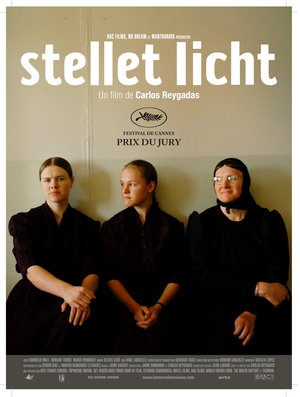
STELLET LICHT
Mexico, 2007, 136 minutes, Colour.
Cornelio Wall, Miriam Toews, Maria Pankratz.
Directed by Carlos Reygadas.
The impressive winner of the Jury prize in Cannes 2007.
However, Stellet Licht is a demanding film, not least because of its cinematic style. With only two films before this, Carlos Reygadas is not a predictable director. His Japon (2002) was a strange blend of realism and mysticism in the Mexican countryside. His Batalla en el Cielo (Battle in Heaven) (2005) was an in-your-face, ugly, brutal and uncompromising glimpse of the underside of Mexico City, culminating in a pilgrimage to the Church of Our Lady of Guadalupe.
Reflection on these two films leads to a realisation that Reygadas feels a great affinity for his Mexican locations, wants to face the harder and harsher aspects of the human struggle, but is fascinated by the religious, prayer and moral implications of his stories.
This interest in the religious and the prayerful is very much to the fore in Stellet Licht. In fact, the visual style and the camerawork ask a contemplative response to the plot and characters. It is unhurried, with long takes of the landscapes and still, focused close-ups on the faces of characters. The film opens with a very long take of the move from the dark of night and the stars to dawn, the rising sun and light pervading the open fields – and the film ends with a corresponding reverse from sunset to darkness.
Within that framework and with a long running time, Reygadas tells a rather simple story of a family, love tensions and betrayal. The characters are Mennonites, descended from 17th century religious refugees from Germany who settled in Mexico, live a more simple life as they farm there. Different episodes show in detail some domestic scenes, like breakfast, scenes of harvesting and the rituals for a laying out of a body before a funeral.
Prayer, of a private kind is important for the Mennonites, especially the lengthy silent grace before meals. The more public and communal prayer is seen the funeral wake.
But morality and conscience is at the core of the film: the husband unfaithful to his devoted wife and the mother of his many children, his dilemma in seeking advice from his preacher father and his attempts at honesty with his wife and his mistress. The characters of both women are very well portrayed, important because it is through their final mystical experience from death to life and the gift of love that the film can reach a conclusion.
Stellet Licht is a film that is going to be included in many courses on religious cinema.
1.The work of Reygadas? His interests, cinematic style?
2.Mexican perspective, European style? The Mennonites in Mexico? The German background? Religious background? Contrast with Mexicans and Catholicism? Their style of life and farming in Mexico?
3.The title, the tone? The length of the film, the contemplative style? The pictures of nature? The contemplation of characters and their profiles?
4.The importance of the visuals: the long opening sunrise sequence, ending with the setting sun? The expanses of the landscape, the close-ups of people? The prolonged gaze? Invitation to contemplation and reflection? The characters? Their inner life? Action? Moral issues, the dilemmas? Religion and prayer? Sin? Meals, work, play, swimming, washing? Travel on the roads? The rain? The experience of death, the laying out of the body, the family in mourning? The miracle – and the long shot of the revival of Esther? The overall effect? Pacing and time?
5.The lack of the musical score? The hymn?
6.The sunrise, the family at the meal, the quiet prayer, saying Amen, eating the cereal, husband and wife, the children, the age range? Going out? Johan staying? Weeping at the table?
7.The relationship between Johan and Esther, their children? His personal dilemma, the relationship with Marianne, discussions with his father? His saying that his marriage to Esther was a mistake? His having a shower, the swimming sequence and the washing, the details of work in the fields, his love for work in the fields? The visits to Marianne, the sexual encounter, his excuses, the breakfast sequence, his trip with Esther, telling her the truth, her reaction, the rain, her going out, his eventually following her, finding her dead, carrying her? Weeping and mourning at her being laid out? With his children, the extended family? The end and her revival?
8.Esther, her age, devoted, the mother, her way of life, a good woman, the breakfast sequences, the washing in the river, at work, her knowing the truth about Marianne, the trip in the car, her condemnation of Marianne, going out in the rain, embracing the tree, her death?
9.Marianne, in herself, her place in the village, the affair, her knowing the reality of what she was doing, her sorrow? Yet being happy? Her love, her regard for Johan? The sex scenes? Esther’s comment on her? Her coming at Esther’s death, going to the room, gently kissing Esther, experiencing Esther’s revival?
10.Johan’s father, preacher, moral, listening, telling his own story to his son?
11.The children, their ages, the boys and girls, the baby, lifestyle, responsibilities, work, swimming and washing? Their grief?
12.The extended family all coming at Esther’s death?
13.The rituals of grief, the strict order of bidding farewell?
14.The kiss, Esther’s revival, her comment about poor Johan? Anita telling her father, people not reacting well? Augtag staying with her mother? Her mother being loved alive?
15.A human story, passion and ordinary experience, sin and repentance, moral issues, the symbolic aspects? The mystical?